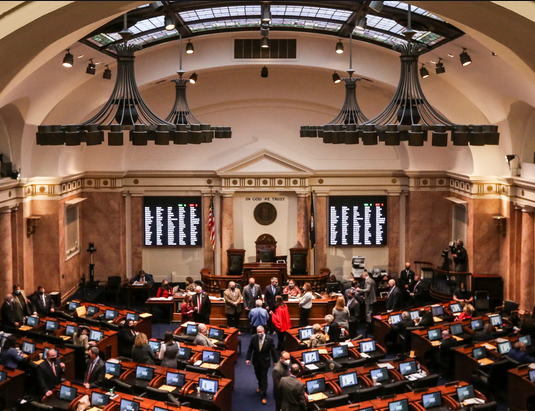Legislature overrides vetoes of three bills limiting governor’s emergency powers; Beshear files lawsuit to nullify those new laws

The Kentucky House of Representatives (Courier Journal photo)
—–
By Melissa Patrick
Kentucky Health News
The legislature’s Republican supermajority flexed its muscle Tuesday and overrode Democratic Gov. Andy Beshear’s vetoes of six bills, three of them designed to limit the emergency powers that he says he needs to thwart the coronavirus pandemic.
Beshear immediately filed a lawsuit in Franklin Circuit Court to nullify the three bills, saying in a news release that he did so to stop legislators from stripping him of his ability “to implement lifesaving public health measures during a pandemic that has killed more than 3,700 Kentuckians.”
“Today, the General Assembly attempted to surrender to Covid-19 and accept the casualties. As your governor, I cannot let this happen,” Beshear said. “I have filed this action to continue to fight for the protection of all Kentuckians.”
Republican lawmakers are looking to limit governor’s powers at a time when the state is recovering from its third escalation of virus cases while suffering more deaths; working to ramp up vaccinations; and warning that new variants of the virus could cause huge spikes in cases by March.
Beshear announced 2,443 new cases Tuesday, lowering the seven-day average to 2,352. This is the fifth straight day the share of Kentuckians testing positive for the virus in the past seven days is below 9 percent, at 8.83%. But Covid-19 deaths remain high, from the holiday-driven escalation of cases; 32 more brought the 14-day average to a near high, 44.14 per day.
Again, Beshear argued that Kentucky has fared better than other states under his orders, seeing fewer cases and significantly fewer deaths.
With very little debate and almost entirely along party lines, all three vetoed bills were repassed by both chambers.
House Bill 1 allows businesses, schools, nonprofits and churches to stay open during the pandemic as long as they have a plan in place that meets the requirements of the least restrictive plan set forth by either the Centers for Disease Control and Prevention or the state administration. It repassed the House 72-22 and the Senate 29-8.
In the House, the only speaker for the bill was Rep. Richard White, R-Morehead, who said, “I feel like us legislators are representing our constituents all across the parts of the state, and I think we should have a little voice or input in some things that’s being said down here in the state.”
Rep. Rachel Roberts, D-Newport, a small-business owner, said CDC guidelines are ever-changing and are meant to be used as guidelines, not as mandates. “I find this bill to be confusing,” she said. “I find it to be reckless, and I think this bill will lead to more loss of life.”
Sen. Matt Castlen, R-Owensboro, the primary sponsor of SB1, said, “To our small-business owners, our restaurants, our families at home teaching their children right now, balancing life and a job and all the other things, the past 333 days have been tough on this state. And we gladly look forward to having a seat at the table representing all corners of Kentucky.”
- Today’s fatalities were a Bourbon County man, 86; a Clay County woman, 51; a Crittenden County man, 97; two Daviess County women, 60 and 88; two Daviess County men, 72 and 77; a Fayette County woman, 81; two Fayette County men, 60 and 87; a Grayson County man, 62; a Hardin County woman, 76; three Hardin County men, 59, 67 and 73; a Henderson County man, 74; two Hopkins County women, 68 and 83; four Jefferson County women, 55, 70, 82 and 86; four Jefferson County men, 63, 63, 69 and 98; a Johnson County man, 79; a Kenton County woman, 78; a LaRue County woman, 69; a Marion County man, 56; an Ohio County woman, 71; and a Pulaski County woman, 90.
- Counties with 10 or more new cases were Jefferson, 349; Boone, 144; Fayette, 140; Kenton, 132; Madison, 81; Campbell, 78; Laurel and Warren, 77; Daviess, 75; Pike, 49; Knox, 47; McCracken, 45; Hopkins and Whitley, 40; Hardin, 39; Nelson and Pulaski, 37; Jessamine, 29; Franklin and Mercer, 27; Anderson, Christian and Taylor, 26; Barren, 25; Allen, Grant and Scott, 23; Clark and Montgomery, 22; Johnson, 21; Bullitt and Harlan, 19; Clay and Ohio, 18; McCreary and Pendleton, 17; Boyd, Henderson, Logan and Monroe, 16; Oldham, 15; Grayson and Russell, 14; Letcher, 13; Calloway and Wayne, 12; Boyle, Edmonson, Floyd, Perry and Woodford, 11; Bourbon, Butler, Martin and Rowan, 10.
- Hospital numbers remained stable, with 1,335 Covid-19 patients, 373 of them in intensive care and 172 of those on ventilators.
- Intensive-care beds are at least 80% full in three hospital-readiness regions: Barren River, 82.41%; the easternmost region, 85.29%; and Lake Cumberland, 97.78%.
- The Biden administration is increasing Kentucky’s vaccine supply by an additional 5%, increasing the state’s supply by 22% the week of Feb. 8, compared with the week of Jan. 25, Beshear’s news release said.